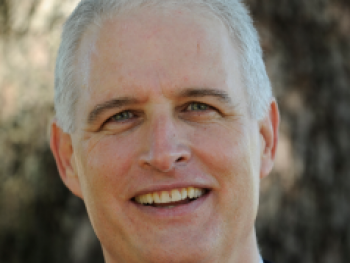issued the following announcement on Dec. 21
Arizona State University’s Bachelor of Science degree program in nonprofit leadership and management this fall became the world’s first undergraduate degree curriculum to be accredited by the international Nonprofit Academic Centers Council.
ASU previously received NACC accreditation in 2019 for its Master of Nonprofit Leadership and Management degree program. At that time ASU was among the first 10 universities to receive the graduate accreditation. One more graArizona State Universityduate program, at the University of San Diego, has been accredited since.School of Community Resources and Development Professor Robert Ashcraft is the director of the Lodestar Center for Philanthropy and Nonprofit Innovation at Arizona State University.Download Full Image
The intensive accreditation process affirms that ASU’s nonprofit leadership and management undergraduate program, offered by the School of Community Resources and Development and supported by the ASU Lodestar Center for Philanthropy and Nonprofit Innovation, aligns with NACC’s curricular guidelines and principles, said Robert Ashcraft, professor in the School of Community Resources and Developement and Lodestar Center director.
“The trailblazing undergraduate accreditation further affirms ASU’s place as an innovative global leader in nonprofit leadership,” Ashcraft said.
Through coursework and co-curricular experiences, ASU students in the nonprofit leadership and management bachelor’s degree program gain the skills and experience to become successful professionals who advance philanthropic and nonprofit work, Ashcraft said.
Applying these skills and experience improves the quality of life within the communities in which they work, he said.
ASU was a pioneer in conferring degrees specifically in the field of leading and managing nonprofits, Ashcraft said, first offering a certificate program through its early “American Humanics” program in 1980–1981 that featured a small curriculum that grew over time.
“It’s an important part of the DNA of our nonprofit education program,” Ashcraft said of the curriculum of 40 years ago.
As the nonprofit sector grew to more than 1.6 million organizations nationwide, the demand grew for education in the field, Ashcraft said.
“Before, many just fell into the work. You were a former teacher, a former banker, and suddenly you’re running a nonprofit,” he said.
The university launched its Bachelor of Science degree curriculum in 2007–2008 after introducing the nation’s first master’s degree program in nonprofit studies the previous academic year. Building on an earlier nonprofit leadership and management certificate program, Ashcraft said, “launching the full undergraduate and graduate degrees represents a notable stake in the ground” that marks a path to the future.
In 2020 ASU’s NLM bachelor’s degree program became the first to be evaluated by the NACC, which thoroughly examined syllabi, the high quality of its faculty and the depth and breadth of course content against NACC’s curricular guidelines.
“For us it meant distinction as our BS degree became the first accredited program in the field, on the heels of the MNLM degree the year before,” Ashcraft said.
The accreditation provides a definitive answer to the question, “Are you who you say you are?” said Laurie Mook, School of Community Resources and Developement associate professor in the nonprofit leadership and management program and a Lodestar Center research associate.
“Most important, we’re a stand-alone program, not affiliated with a business school or public affairs school, which gives us independence of thought and direction with no public-sector or business influence,” Mook said.
Therefore, the program promotes the nonprofit sector from the ground up, she said.
Mook said the program contains “the whole gamut of nonprofit theory and practice, and a critical side to address issues of diversity, equity and inclusion. Students also have the advantage of gaining field experience through internships which can lead to many professional opportunities after graduation.”
Ashcraft said the accreditation helps solidify ASU as an epicenter of the “third sector” of society, the nonprofit sector, in addition to the other two better-known public and private sectors, putting a spotlight on the vital role nonprofits play in society.
“People typically think society consists of the marketplace of business markets and the economy, and the public space of government. But there is a third sector,” he said. “It helps build a civil society.”
Ashcraft said that now, within the NACC, ASU is “well respected as we affirmed our leadership role as a real trail-blazer. Nobody said, do this, go through accreditation. We literally wanted to be examined.”
Today ASU can point to its undergraduate nonprofit leadership and management program’s unique distinction to attract students, Ashcraft said.
“It puts a spotlight on it, affirming the long-standing work of this university and this college in the (nonprofit leadership and management) education field” he said. “There are increasing numbers of bachelor’s degrees. We can take pride in being the pioneer in putting the stake in the ground; (accreditation is) another way of recruiting students.”
“It brings a lot of pride to the program for the students and faculty,” Mook said. “It puts us in the front of the pack. It fits very nicely.”
According to the NACC website, ASU’s baccalaureate nonprofit leadership and management program meets these NACC curricular guidelines and principles:
- A nonprofit/philanthropy-first approach to subject matter, philosophy and perspective.
- A nonprofit-first undergraduate pedagogical subject matter that is relevant to the teaching emphasis for what an educated undergraduate student should know about the nonprofit/philanthropic sector.
- A nonprofit pedagogy utilizing terminology that synchronizes with the nomenclature and themes found in the NACC Undergraduate Curricular Guidelines.
Original source can be found here.

Source: Arizona State University






 Alerts Sign-up
Alerts Sign-up